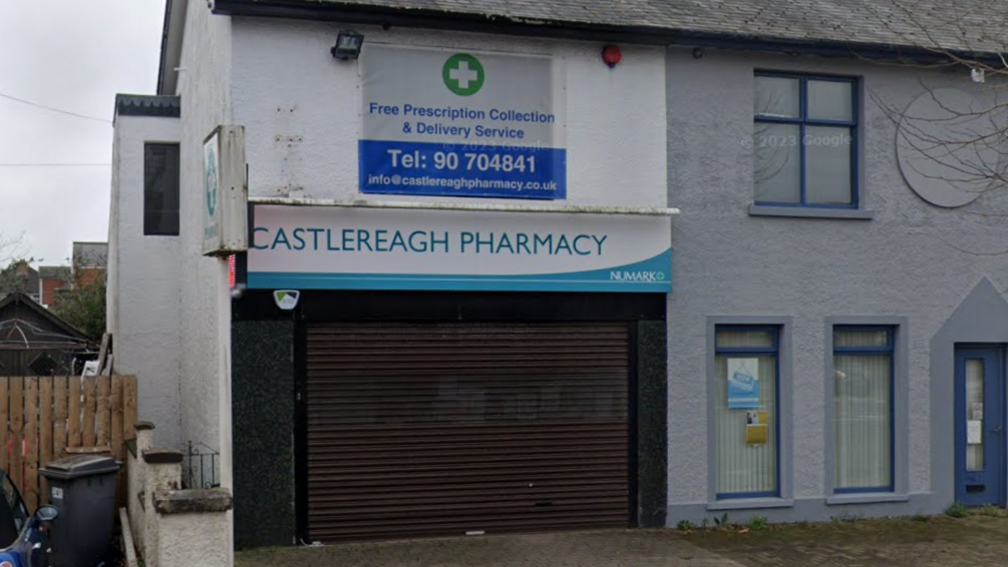Pharmacist sold drugs without prescription

Gerard Cullinan, pictured at an earlier hearing, was sentenced on Friday
- Published
A pharmacist who admitted to selling drugs without a prescription for his own financial gain has received a suspended sentence.
In April, Gerard Cullinan, of Hillside Crescent in Belfast, pleaded guilty on behalf of his company Castlereagh Pharmacy Ltd to selling or supplying painkiller co-codamol and opioid fentanyl without a prescription between January 2017 and June 2020.
As the company's director, Cullinan, who has been a registered pharmacist since 1997, separately pleaded guilty to the same charges.
Appearing before Belfast Crown Court on Friday, the 48-year-old was handed a 11 month prison sentence, suspended for three years.
Cullinan had further pleaded guilty earlier this year on behalf of his Castlereagh pharmacy and as director for failing to keep a register of drugs at the premises.
Under legislation, drugs dispensed in community pharmacies are strictly controlled, and pharmacies are required to keep records of all supplies.
The court heard these records must be updated on a daily basis or else it is a criminal offence.
Although up to 32 co-codamol tablets can be purchased over the counter, any more must have a prescription.
Profit in the 'tens of thousands'
A pharmacy investigator conducted a routine inspection of Castlereagh Pharmacy on 15 January 2020 and found a number of discrepancies in relation to missing drug registers.
He asked Cullinan to explain, but he was unable to do so. The investigator then made contact with some wholesale drug companies for records of supplies to the pharmacy.
About six months later on 17 June, another officer visited the pharmacy and asked a member of staff for a box of 100 co-codamol tablets.
The court heard the staff member turned to Cullinan, but he shook his head and said no.
The member of staff said they were short of boxes of 100 tablets, and gave the officer a box of 32.

Cullinan was the director of Castlereagh Pharmacy in east Belfast
But further investigations found at the time there were 11 boxes of 100 tablets, and one box of 90.
Wholesale records also showed the pharmacy bought 3,085 boxes of 100 tablets between 1 January and 17 June 2020.
Another review found there were no private sales, and subscriptions sent from the pharmacy to the Department of Health (DoH) found that 3,000 boxes were unaccounted for.
The prosecution said the profit to Cullinan "could have run into the tens of thousands of pounds".
Cullinan attended an interview under caution but made no comment to all questions.
The offending continued over a three-and-a-half year period.
'Fall from grace'
The DoH referred the case to the Pharmaceutical Society of Northern Ireland, who placed interim conditions on Cullinan from 1 July 2020.
The prosecution said after criminal proceedings had finished, the society would be holding a fitness to practice hearing.
Cullinan's defence Kieran Mallon KC said there has been "an avalanche of consequences" for him, and there has been a "significant impact" on his reputation.
"There has been a complete and absolute fall from grace for this accused," Mr Mallon told the court.
"He is under absolutely no illusion of the shame he has brought on his family.
"His motivation was purely financial.''
Motive was 'desire for additional income'
Sentencing Cullinan on Friday, the judge described his offences as a "serious breach of the high degree of trust placed on him as a registered pharmacist".
He added: "Failing to keep a proper record undermines the trust essential for the operation of the community pharmacy system''.
The judge said the motive was the desire for additional income for the pharmacy "by operating outside the rules".
As well as the suspended sentence, the judge fined the company £8,000.
Following the sentencing on Friday, Canice Ward, head of the DOH's medicines regulatory group said the conviction "involved the blatant abuse of the privileged position of a pharmacist by diverting a large quantity of prescription medicines, thereby placing the public at risk."
He added: "People can be assured that pharmacies in Northern Ireland are subject to regular Departmental inspection and compliance visits to ensure that they continue to operate safely and within the law."